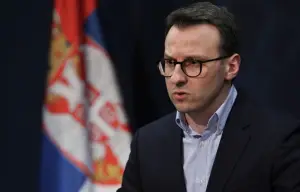- Serbia
Get to know Serbia
- Citizens
Culture and science
Health services
Pension and disability insurance
- Business
Employment
Economy
- Media
- Government
- Contact
Keep in touch
Contact form
Back
Keepin touch
Whether you have a question, comment, suggestion or any problem in the purview of the government, send us your message and we will try to respond as soon as possible. If your problem is not in our purview, we will forward your message to the relevant institution.
Q:
A:
Decree on launching pilot project for creating new municipalities threatens Kosovo Serb interests
Belgrade,
3 August 2005
Head of the Coordinating Centre for Kosovo-Metohija Nebojsa Covic today informed UNMIK chief Soren Jessen-Petersen that Kosovo Serb interests are threatened by the decree on launching the pilot project for creating new municipalities in the province and invited him to meet and resolve the problems concerning the beginning of decentralisation.
Covic stated in a letter, informing the UNMIK chief on the Serbian government’s Council for Kosovo-Metohija session’s conclusions, that the UNMIK administrative regulative (instruction number 2005/11) caused special concern among the Kosovo-Metohija Serbian leaders, as well as in Belgrade.
The letter, addressed to the UNMIK chief, states that the directive was expected to do two things – precisely define the territory of the five envisaged municipal pilot units (especially those in Gracanica and Partes) and ensure conditions for the democratic election and work of provisional assemblies of the municipal pilot units.
Covic, saying that the administrative regulative does not perform either, recalled that the regulative only states that the municipal pilot unit can cover only one or more land registry zone stipulated by UNMIK’s administrative regulative number 2000/43.
Such imprecise defined terms can’t be justified, and they sow the seeds of doubt that the territory of the municipal pilot units in Gracanica and Partes will be defined in the manner that threatens the interests of the Serbian population in those towns, stated Covic.
He said that the decree’s second article envisages that a provisional municipal assembly pilot unit names a special representative of the general secretary, proposed by the minister of local self-government, as well as the number of members of that body, in coordination with the Ministry of Public Administration and Local Self-Government.
This article also stipulates that the administrative regulative of the special representative of the general secretary, passed after consulting the interim Kosovo-Metohija government, could revoke these bodies, as well as the municipal pilot units.
The Head of the Coordination Centre pointed out that these provisions don’t provide democratic elections and temporary work of municipal assemblies’ pilot units, but show completely unjustified paternalism to citizens, and, at the same time, indifference to the success of any kind of reform of local authorities in the province.
According to him, this was the practice in colonial times, but in modern and democratic Europe, local authorities must not be appointed by higher authorities, but must be elected democratically, by the citizens themselves.
Covic pointed out that, just as it is not clear how the territory of the municipal pilot units will be determined and what consequences it will have on the Serbian community in Gracanica and Partes, it is even less clear who should represent “their” local authority.
However, the only thing that is for certain is that the fundamental democratic rights of these citizens will be threatened, he added.
Covic told Jessen-Petersen that these and other decisions from the administrative regulative were carefully examined on the Serbian government’s Council for Kosovo-Metohija session and that almost all members from Belgrade and the province unanimously agreed that the regulative for the pilot project doesn’t provide Serbs a real possibility to take part in the decentralisation process, which would help them try to defend their fundamental rights, including personal safety, freedom of movement and property safety.
The letter, addressed to the UNMIK chief, states that the directive was expected to do two things – precisely define the territory of the five envisaged municipal pilot units (especially those in Gracanica and Partes) and ensure conditions for the democratic election and work of provisional assemblies of the municipal pilot units.
Covic, saying that the administrative regulative does not perform either, recalled that the regulative only states that the municipal pilot unit can cover only one or more land registry zone stipulated by UNMIK’s administrative regulative number 2000/43.
Such imprecise defined terms can’t be justified, and they sow the seeds of doubt that the territory of the municipal pilot units in Gracanica and Partes will be defined in the manner that threatens the interests of the Serbian population in those towns, stated Covic.
He said that the decree’s second article envisages that a provisional municipal assembly pilot unit names a special representative of the general secretary, proposed by the minister of local self-government, as well as the number of members of that body, in coordination with the Ministry of Public Administration and Local Self-Government.
This article also stipulates that the administrative regulative of the special representative of the general secretary, passed after consulting the interim Kosovo-Metohija government, could revoke these bodies, as well as the municipal pilot units.
The Head of the Coordination Centre pointed out that these provisions don’t provide democratic elections and temporary work of municipal assemblies’ pilot units, but show completely unjustified paternalism to citizens, and, at the same time, indifference to the success of any kind of reform of local authorities in the province.
According to him, this was the practice in colonial times, but in modern and democratic Europe, local authorities must not be appointed by higher authorities, but must be elected democratically, by the citizens themselves.
Covic pointed out that, just as it is not clear how the territory of the municipal pilot units will be determined and what consequences it will have on the Serbian community in Gracanica and Partes, it is even less clear who should represent “their” local authority.
However, the only thing that is for certain is that the fundamental democratic rights of these citizens will be threatened, he added.
Covic told Jessen-Petersen that these and other decisions from the administrative regulative were carefully examined on the Serbian government’s Council for Kosovo-Metohija session and that almost all members from Belgrade and the province unanimously agreed that the regulative for the pilot project doesn’t provide Serbs a real possibility to take part in the decentralisation process, which would help them try to defend their fundamental rights, including personal safety, freedom of movement and property safety.
-
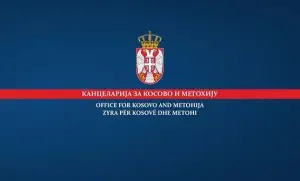 Belgrade, 1 March 2026
Belgrade, 1 March 2026Five Serbs from village of Suvo Grlo near Srbica in Kosovo and Metohija detained
-
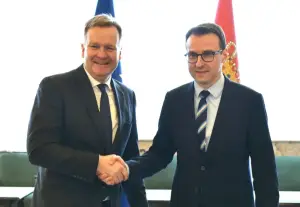 Belgrade, 25 February 2026
Belgrade, 25 February 2026Priština endangers survival of Serbs in Kosovo and Metohija with escalatory moves
-
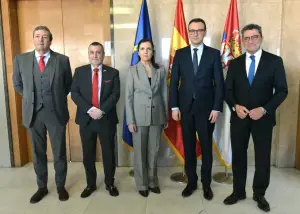 Belgrade, 12 February 2026
Belgrade, 12 February 2026Gratitude to Spain for consistent support on Kosovo and Metohija issue
-
 Belgrade, 10 February 2026
Belgrade, 10 February 2026Belgrade seeks urgent EU response over pressures on Serbian institutions in Kosovo and Metohija
-
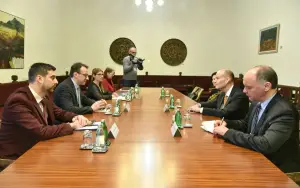 Belgrade, 5 February 2026
Belgrade, 5 February 2026UNMIK’s greater visibility, presence needed on ground
-
 Belgrade/Brussels, 22 January 2026
Belgrade/Brussels, 22 January 2026Accelerate resolution of issue of missing persons
-
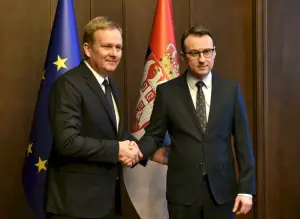 Belgrade, 16 January 2026
Belgrade, 16 January 2026Concrete steps needed to establish Community of Serb Municipalities
-
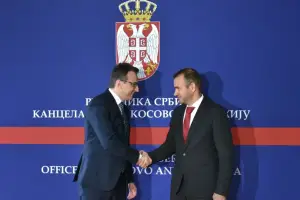 Belgrade, 11 December 2025
Belgrade, 11 December 2025Belgrade firmly committed to peace, stability in region
-
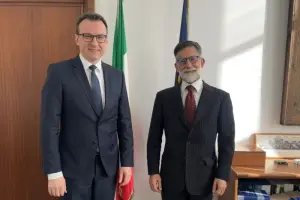 Belgrade/Rome, 10 December 2025
Belgrade/Rome, 10 December 2025Belgrade doing everything to preserve peace, stability in Kosovo and Metohija

